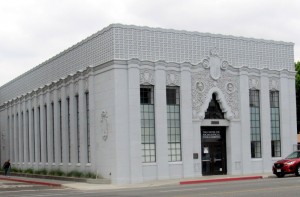On April 24th AAUW members enjoyed an Out & About tour of the newly renovated and restored Citrus Belt Savings & Loan Building which is now home to The Riverside Community College District’s Center for Social Justice & Civil Liberties located at 3855 Market Street, Riverside. Best known for its collection of the art work and humanities collection of Riverside Community College alumna Miné Okubo, whose works played a significant role in documenting the history of Japanese Americans in the United States including her own experiences in an internment camp during WW II in Utah, the Center is a testament to Riverside’s commitment to honor its multicultural history.
The first floor exhibition entitled Riverside Stories highlights the good and the bad side of Riverside’s social justice and civil rights history through the stories of seven residents: The Harada family, who challenged the Alien Land Act in the courts on behalf of their American born children; Frank Johnson, who fought to integrate a public swimming pool in the 1920s; Native American Rupert Costo, Riverside Community College alum, who went to Washington, D.C. to fight for tribal water rights and with his wife, Jeannette Costo, were prominent national leaders in the fight for the economic and social rights for Native Americans; John Sotelo, the first Mexican American to be elected to Riverside’s city council, worked to secure equal treatment for minority groups by ensuring representation in city government and securing community facilities for underserved neighborhoods; Thomas Rivera, an author, migrant rights supporter and educator who became the first Mexican American chancellor of UC Riverside; original owner of the Mission Inn and stalwart supporter of civil rights. The first floor also houses the Digital Media Resource Center which holds a repository of video, film, photographs and personal documents for more in depth study of Riverside’s significant cultural history.
The second floor houses the rich and varied works of Miné Okuba who over her lifetime experimented with cubism, charcoal drawings, watercolor and tempera to ink on paper. As viewers of the vast collection (8,000 pieces of art, professional papers and personal memorabilia), a large portion of which is still being archived, one is struck by the breadth of her artistic ability to change styles and mediums.
The Center also houses a temperature controlled archive and storage room complete with a scholar workroom for visiting scholars, graduate students and experts who wish to pursue more a more in-depth understanding and further development of Mine’s vast collection. Through NEA grants graduate students are welcomed to further develop Mine’s collection.
The Center can only be seen through pre-arranged visits by calling or contacting the center at (951) 222-8846 or socialjustice@rccd.edu. There are also opportunities for support and named gifts (naming the building, a floor level, etc…) if you wish to contribute towards supporting the exhibitions and operations of the Center through the RCCD Foundation (951)-222-8627 or rccd.edu/foundation). For more information on the Center, to see samples of the artwork and displays and speakers at the preview opening held in June 2012 go to socialjustices.rccd.edu/foundation/Pages/Exhibition.

